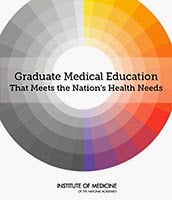APA President Paul Summergrad, M.D., issued a response Friday on behalf of APA addressing issues...
IOM Argues for Long-Term Change in Residency Funding
 |
Greater transparency and accountability in the funding process are required, as well, said the IOM committee. The present direct and indirect funding streams should be merged into a single fund with two subunits that would support currently authorized GME residency programs and finance innovative GME programs.
The IOM committee recommended maintaining GME funding at present levels ($9.7 billion in 2012), but changes should be made over a period of 10 years to modernize GME payment methods based on performance, to ensure program oversight and accountability, and to reward innovation in the content and financing of GME. The plan calls for a GME policy council within the Department of Health and Human Services and a second center within CMS to manage operations of the system.
The committee also raised questions about the physician workforce of the future. Among its recommendations was the development of research and policy "regarding the sufficiency, geographic distribution, and specialty configuration of the physician workforce." Both the Association of American Medical Colleges and the AMA have issued responses raising concerns about the IOM’s comments.
“Graduate medical education is a critical issue for psychiatry, and we appreciate that the IOM has offered a major report on the future of funding for residency training,” said APA President Paul Summergrad, M.D., the Arkin Professor and Chairman of Psychiatry at Tufts University School of Medicine and Psychiatrist-in-Chief for Tufts Medical Center. “The report needs and deserves a comprehensive review, and APA will present our analysis soon. We, of course, are concerned about the shortage of physicians overall and of psychiatrists in particular, and are eager to understand the potential impact of the IOM's recommendations.”
(Image: Institute of Medicine)





